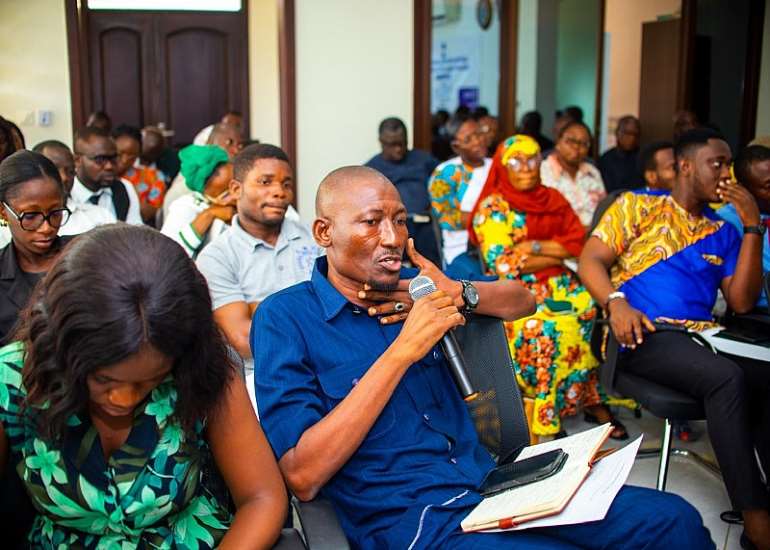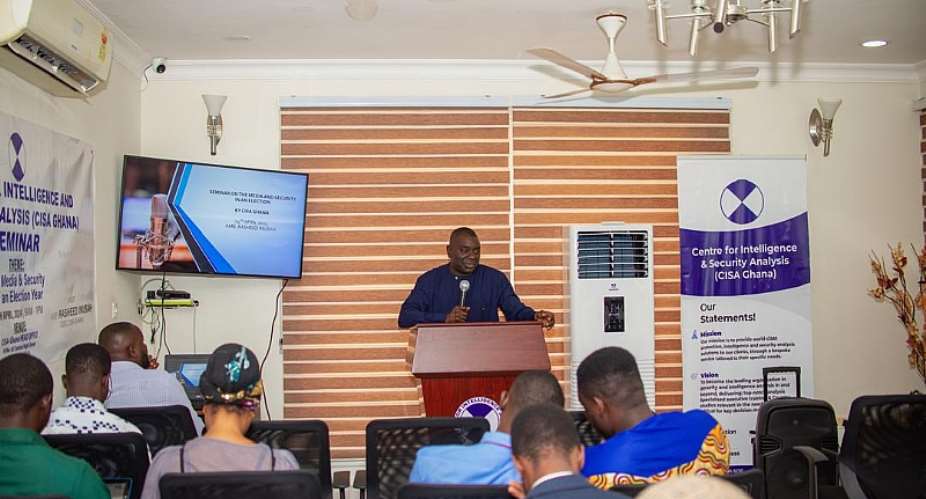The Centre for Intelligence and Security Analysis (CISA), a non-governmental organisation within the security and intelligence domain, has called on the Government to enact a new counter-terrorism legislation to bolster the country’s fight against terrorism.
The new legislation, which the Centre names the; 'Foreign Fighters Act (FFA),' would cater for the reintegration of radicalised youth and war returnees and proffer stiffer punishment for persons who engaged in terrorism activities.
Mr Rasheed Inusah, the Chief Executive Officer of CISA, made the call at a sensitisation workshop for some selected media practitioners, in Accra, on Friday.
It was on the theme: “The Media and Security in an Election Year.”
The Ghana Anti-Terrorism Act, 2008, Act 762, is the principal legislation that underlines the legal framework on Violent Extremism and Terrorism in Ghana.
Mr Inusah, a former Director-General of the National Intelligence Bureau (NIB), however, noted that the absence of a FFA was worrying.
He explained that over the past few years, there had been a rise in the reported number of Ghanaian youth who had either joined terrorist groups or run to war zones or terrorist cells, stressing that even though the country had not witnessed any terrorist attack, the situation was alarming.

“The absence of Foreign Fighters Act is worrying as more Ghanaian youth run to war
zones, terrorist cells; and return as radicalised lone wolves or form sleeper cells,” Mr Inusah said.
“In 2015, a 25-year-old Ghanaian graduate, Mohammed Nazir Nortei Alema, was recruited by ISIS but later died in Syria.”
In October 2017, there were reports that about 100 Ghanaian migrants joined ISIS in Libya, with some forcefully conscripted while others joined voluntarily for financial rewards and safety.
Again, since January 2024, there have been reports of an unspecified number of Ghanaians recruited into both sides of the ongoing Russia-Ukraine conflict.
“As more and more are recruited to the warzone, what happens if they return to settle back home,” Mr Inusah quizzed.
He, therefore, urged the Government to immediately enact legislation to cater for the reintegration of such groups of people to maintain the peace and security of the state.
“It is now time for most countries in Africa, especially Ghana, to consider the urgent need to address these concerns through the enactment of new counter-terrorism legislation (Foreign Fighters) Act.”
More dire, he said, was the increasing threat of “home-grown sleeper cells and lone wolves,” which refers to a group of operatives, spies or terrorists living in secret among a targeted community.
“The FFA will bestow the law enforcement agencies with the powers to take effective action in advance of any terrorist act being committed,” he added.
The former Director-General of the NIB expressed concern over the current economic situation in the country, warning that the phenomenon had made the youth more susceptible to foreign exploitation and outside predators.
He urged the Government to address the challenges, particularly the high youth unemployment situation, which currently stands at 12.2 per cent, to curb future recruitment of the youth by those terror groups.
He called for adequate safeguards to strengthen the capabilities of the security and intelligence institutions to keep the country safe.
Touching on the responsibilities of the media to safeguard the electoral process, Mr Inusah said journalists must avoid sensationalism, fear-mongering, and dissemination of false information as those could pose national security threats.
He urged the media to prioritise their safety, especially at election hotspots, and ensure they remained neutral, focus on reporting the facts, and give an ear to all sides for a balanced reportage.

CISA is a non-governmental organisation focused on security and intelligence, which works to articulate and help address the many security challenges confronting the West African Sub-region.
It uses various tools, including systematic research and publication of articles by CISA analysts and seasoned security and intelligence practitioners to achieve its goals.
GNA





 Ensure private schools employ professional teachers, not SHS graduates — Xandy K...
Ensure private schools employ professional teachers, not SHS graduates — Xandy K...
 Alan Kyeremanten was the brain behind Ghana Card not Bawumia — Hopeson Adorye
Alan Kyeremanten was the brain behind Ghana Card not Bawumia — Hopeson Adorye
 I'm not running for office for power prestige, I just want to solve Ghana’s prob...
I'm not running for office for power prestige, I just want to solve Ghana’s prob...
 Provide immediate assistance to our displaced residents — Oda Nkwanta residents ...
Provide immediate assistance to our displaced residents — Oda Nkwanta residents ...
 Send nurses abroad; it’s a better option than being unemployed in Ghana — NDC Pa...
Send nurses abroad; it’s a better option than being unemployed in Ghana — NDC Pa...
 Bawumia stole free tertiary education for Persons with Disabilities from NDC’s 2...
Bawumia stole free tertiary education for Persons with Disabilities from NDC’s 2...
 Ejisu by-election: Anger is bound to occur but return to your 'sweet home' — Nan...
Ejisu by-election: Anger is bound to occur but return to your 'sweet home' — Nan...
 Limited voters registration: Don't allow politicians to engage your minors for p...
Limited voters registration: Don't allow politicians to engage your minors for p...
 Ferry on Oti River breaks down; drivers and passengers stranded
Ferry on Oti River breaks down; drivers and passengers stranded
